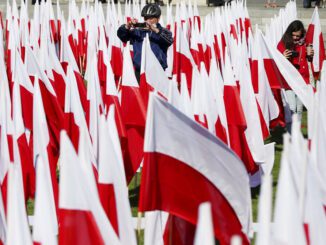WARSAW, Poland — Polish President Andrzej Duda declared victory Monday in a runoff election in which he narrowly won a second five-year term. Acknowledging the campaign he ran was often too harsh, he appealed for unity and forgiveness.
The close race followed a bitter campaign between Duda and Warsaw Mayor Rafal Trzaskowski that was dominated by cultural issues.
Duda celebrated what was seen as a mandate for him and the right-wing ruling party that backs him, Law and Justice, to continue on a path that has reduced poverty but raised concerns by critics that democracy is under threat.
“It was a very sharp campaign, probably too sharp at times,” Duda told supporters in Odrzywol, a town near Warsaw. “If anyone is offended by my words, please forgive me. And give me the chance to improve in the next five years.”
Duda received slightly over 51% of Sunday’s vote with 99.98% of voting districts reporting, the state electoral commission said. Trzaskowski got just under 49%.
Duda told supporters in Odrzywol that he was grateful and moved by winning the support of more than 10 million voters. He said that with the race now over, it was time to turn to the difficult job of returning the country to strong growth after the economic blow of the coronavirus.
Trzaskowski conceded defeat and congratulated Duda. He thanked his supporters and said his strong showing would be the catalyst to fight to keep Poland from becoming a one-party state.
“This is just the beginning of the road,” Trzaskowski said.
Among those who welcomed Duda’s victory were Hungary Prime Minister Viktor Orban, as well as Czech leaders.
Orban congratulated him on Facebook, saying “bravo!” while Czech President Milos Zeman through a spokesman said: “Long live Poland!”
The result was dispiriting for liberals in Europe who are keen to halt what they consider the threat of populism and nationalism.
Remigijus Simasius, the liberal mayor of the Lithuanian capital of Vilnius, offered his condolences to Poles and said the small difference in support of about 2% “sometimes determines the path between progress and regress.”
Duda got help from U.S. President Donald Trump, who invited him to the White House invitation in late June and said he was “doing a terrific job.”
His campaign focused on defending traditional family values in the predominantly Catholic nation of 38 million people, and on preserving social spending policies.
The party’s popular policies included lowering the retirement age and paying monthly cash bonuses of $125 per child to all families irrespective of income.
Many credit Law and Justice for being the first party to reduce the economic inequality that came with Poland’s transition from communism to a market economy three decades ago. There is a strong sense among Poles that the economic help is restoring a sense of dignity after decades of hardship from war, communism and the upheaval brought by capitalism.
The party also stoked conflict with the EU by taking control of the top courts and judicial bodies. Officials in Brussels repeatedly expressed concern over the rule of law in both Poland and Hungary, which were for many years hailed as the most successful democracies to emerge from behind the Iron Curtain.
Law and Justice officials have said they plan to continue reshaping the justice system and also want to nationalize foreign-owned private media outlets. Critics fear that lower courts will face increased political pressure and that press freedom will face new threats.
Zselyke Csaky, an expert on central Europe with the human rights group Freedom House, said Duda’s victory gives the party “essentially free rein” until parliamentary elections in 2023 “to do away with limits on its power and work towards destroying Poland’s independent institutions, such as the judiciary or the media.”
Sunday’s vote was originally planned for May but was delayed by the coronavirus pandemic. Turnout was 68.1%, close to a record set in 1995, in a sign of the huge stakes for Poles.
As the race tightened, Duda turned further to the right in search of votes. He denounced the LGBT rights movement as an “ideology” worse than communism.
The Organization for Security and Cooperation in Europe, which monitored the election, said that while well organized, “negative campaigning and mutual vilification abounded” in the campaign.
But the World Jewish Congress focused on Duda’s past condemnations of anti-Semitism in a congratulatory statement.
“President Duda has spoken out against this hatred, and we remain hopeful that he will continue to do so,” WJC President Ronald Lauder said.
During the campaign, Duda also lashed out at a German correspondent and a partly German-owned tabloid for their campaign coverage, alleging “a German attack in these elections.” A German Foreign Ministry spokesman said Monday that Berlin works “outstandingly” with the Polish government and would continue to do so.



